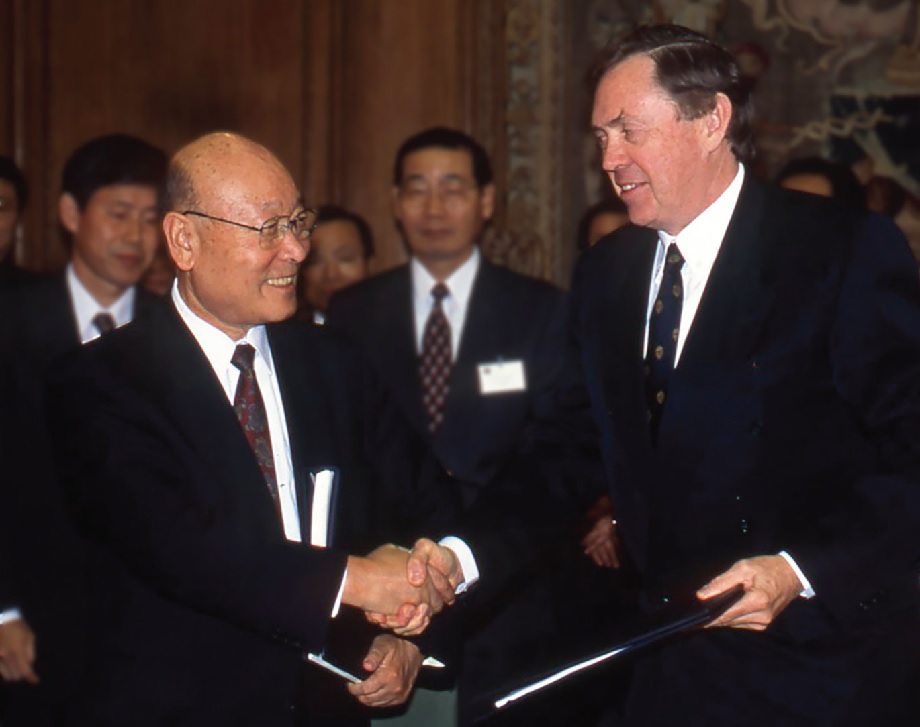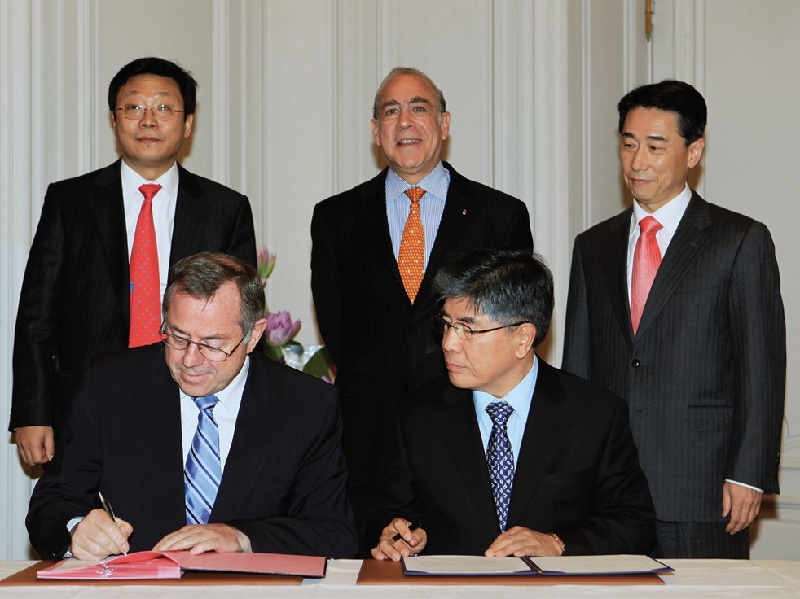Korea’s accession to the OECD: A history

In 2016 Korea celebrates 20 years of membership in the OECD. In the early 1980s, following a period of remarkably successful economic growth, it commenced a programme of financial liberalisation and then, from 1993, more general economic and regulatory reform. There were three major reasons for the change in approach. The first was the increasing international influence of the market and the second was growing international and domestic pressure for Korea to remove trade restrictions, increasingly important as the Uruguay Round negotiations led to the establishment of the WTO. A third reason was pressure from increasingly powerful industrial groups or chaebols for liberalisation, especially as regards lifting the ceiling on their ownership of bank shares, greater freedom in foreign borrowing and raising the aggregate credit ceiling.
Membership of OECD formed part of President Kim Young-sam’s globalisation policy . Some economists and journalists at home and abroad had expressed scepticism about membership of the OECD, while farmer and social groups were opposed to the aim of full liberalisation. The major reform effort included the decision to attempt to enter the OECD for a variety of related motives. For instance, membership of such an international body would have value in convincing US administrations that Korea was serious about opening its markets. It also added credibility and clout to reform efforts in the face of domestic opposition, notably those in the Seventh Economic and Social Development Plan, 1992-96 and the Liberalisation Blueprint of 1993; indeed, the aim of membership of the OECD was made explicit in the Plan, developed in 1989. There were also the opportunities for policy learning that membership offered, while the OECD’s decision to commence an informal and exploratory dialogue with the “Dynamic Asian Economies” (DAEs) in 1989, including Korea, was another motivating factor.
There were concerns that Korea’s economic and social standards were not yet completely compatible with the OECD principles, which in some ways could be expected. There were four main sticking points in Korea’s accession process: one was the OECD Codes of Liberalisation; second was Korea’s membership of the Group of 77; labour rights formed a third difficulty; while the fourth was the country’s developing country status, especially for trade and environmental issues. The possibility of Korean membership was discussed at the OECD in 1990 and soon became entangled with discussions regarding the membership prospects of several Central and Eastern European countries following the break-up of the Soviet bloc. All were sympathetic to Korean membership, and many, including the US, saw Korean accession as a test of the OECD’s openness and flexibility.
As indicated to OECD Secretary-General Jean-Claude Paye by Foreign Minister Lee Sang-ok in 1992, the period to 1996 would be one of increasing Korean engagement and it rapidly became a full participant in the Council Working Party on Shipbuilding, the Development Centre, the Nuclear Energy Agency and the Steel Committee, and was granted observer status in an increasing number of other committees. The process of engagement progressed relatively smoothly with a generally positive OECD Economic Survey of Korea issued in 1994. However, in July of that year, as an early sign of future tensions to come in the formal accession process, the Trade Union Advisory Committee to the OECD (TUAC) made strong representations to the organisation alleging the abuse of trade union rights in Korea, an issue that had not figured in earlier OECD accession processes. Korea was invited to become an observer on the Employment, Labour and Social Affairs Committee (ELSAC) in October, which would put it in a better position to respond to TUAC’s assertions.
Foreign Minister Gong Ro-myung, in a letter to the OECD Secretary General in 1996 provided assurances that labour laws would be amended based on recommendations of the Presidential Commission on Industrial Relations reform. But some member countries, as well as TUAC, wanted to see progress of reforms. Indeed, ELSAC deemed that the eventual reform as such did not fully meet the commitments made by the Korean government with respect to freedom of association and the right to collective bargaining (OECD Council document C/M(97)2/PROV). The labour law reform in Korea was a sensitive matter, and put the complexities of the OECD accession process in the public eye. A confidential letter from Foreign Minister Gong was later published in the Financial Times which was “embarrassing for the organisation and disagreeable for one of its members” (OECD Council document C/M(97)2/PROV).
In March 1995 Korea submitted its application for membership, to the satisfaction of most countries which were keen to see the OECD bringing in new countries and driving global development. Nevertheless, the OECD Council was divided over some issues. Non-European members protested that the criteria proposed by the organisation for assessing the merits of the application were tougher for Korea than for Mexico (1994), the Czech Republic (1995), Hungary (1996), and Poland (1996). After further discussion the matter was resolved and the procedures for accession were agreed. Hence, in the following months Korea underwent a detailed examination that covered its policies and practices relating to capital movements, international investment, international trade, banking, insurance policies, labour relations, education, agriculture, climate change, environment, and maritime transportation.

In summary, the examination was followed by agreement on recommendations that its liberalisation policies be accelerated, although Korea had reportedly agreed to immediately implement only some 65% of the OECD’s Codes of Liberalisation. Korea maintained that they “did their best” and that significant progress had been achieved in the liberalisation of capital movements, services and investment. Korea reasoned that progressive liberalisation of policies was necessary for the stability of the macro-economy. They also felt that more weight could be given to Korea’s track record as a whole and that past efforts strongly pointed in the direction of greater liberalisation. In its final report to the Council the Financial Markets Committee drew comfort from the Korean authorities’ statement that the government would “continue its efforts towards financial liberalisation, including the liberalisation of international capital movements and cross-border financial services” (see paragraph 14 of Annex II in the OECD Council document C(96)168). It nonetheless required a review of financial policies within two years of accession.
Korea took up membership of the OECD in December 1996, crowning an era of strong growth and development. Though its advances and assurances in meeting OECD membership requirements had been met, unusually, the organisation continued to monitor its progress on labour relations reform for another decade, until 2007. For the organisation, welcoming a new Asian member country was a major step forward in consolidating its own opening and outreach in a burgeoning and increasingly important region, in line with the founding aims of the OECD. In the accession ceremony, Foreign Minister Gong expressed the hope that OECD accession would “be remembered as an important turning point in the annals of Korean diplomacy and economic history”.
Visit www.oecd.org/korea and www.oecd.org/investment/investment-policy/codes.htm
OECD Economic Surveys: Korea 1994 https://doi.org/10.1787/eco_surveys-kor-1994-en
Korea's Experience of OECD Peer Reviews https://doi.org/10.1787/9789264039445-16-en
Burton, John, Taylor, Robert (1996), “S Korea braces for restructuring: OECD membership will promote shift towards market economy”, Financial Times, London https://www.ft.com/
Kang, Susan (2008), “Contestation and Collectivities: Protecting Labor Organizing Rights in the Global Economy”, a doctoral dissertation submitted at the University of Minnesota https://twin-cities.umn.edu/
Lee, Chung, Lee, Keun, and Lee, Kangkook (2002), “Chaebols, Financial Liberalization and Economic Crisis: Transformation of Quasi-Internal Organization in Korea”, Asian Economic Journal 2002, Vol. 16 No. 1 http://www2.hawaii.edu/~lchung/Revised3lee.pdf
Salzman, James (2000), “Labor Rights, Globalisation and Institutions: the role and influence of the Organization for Economic Cooperation and Development”, Michigan Journal of International Law, Vol. 21 https://papers.ssrn.com/sol3/papers.cfm?abstract_id=259911
